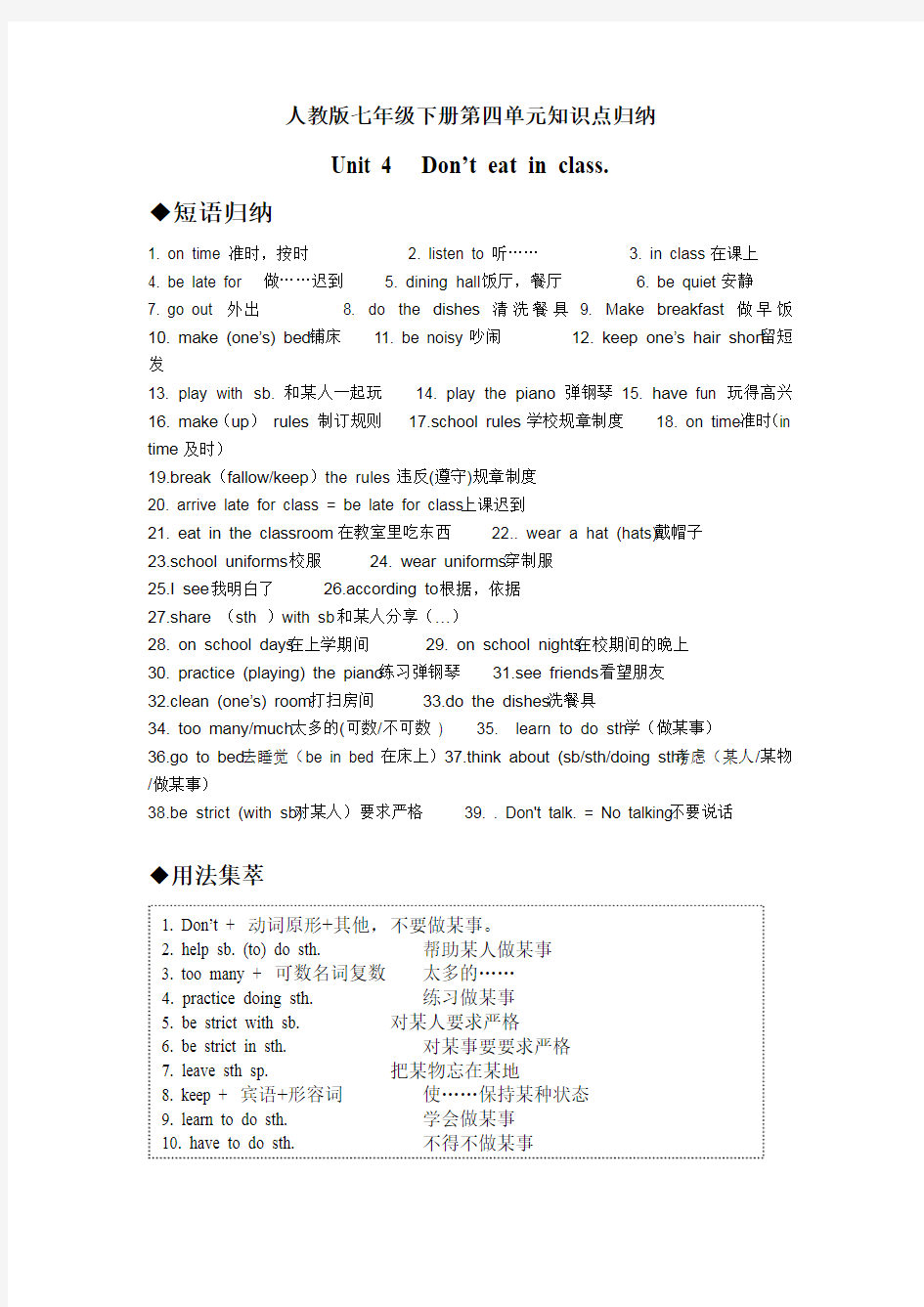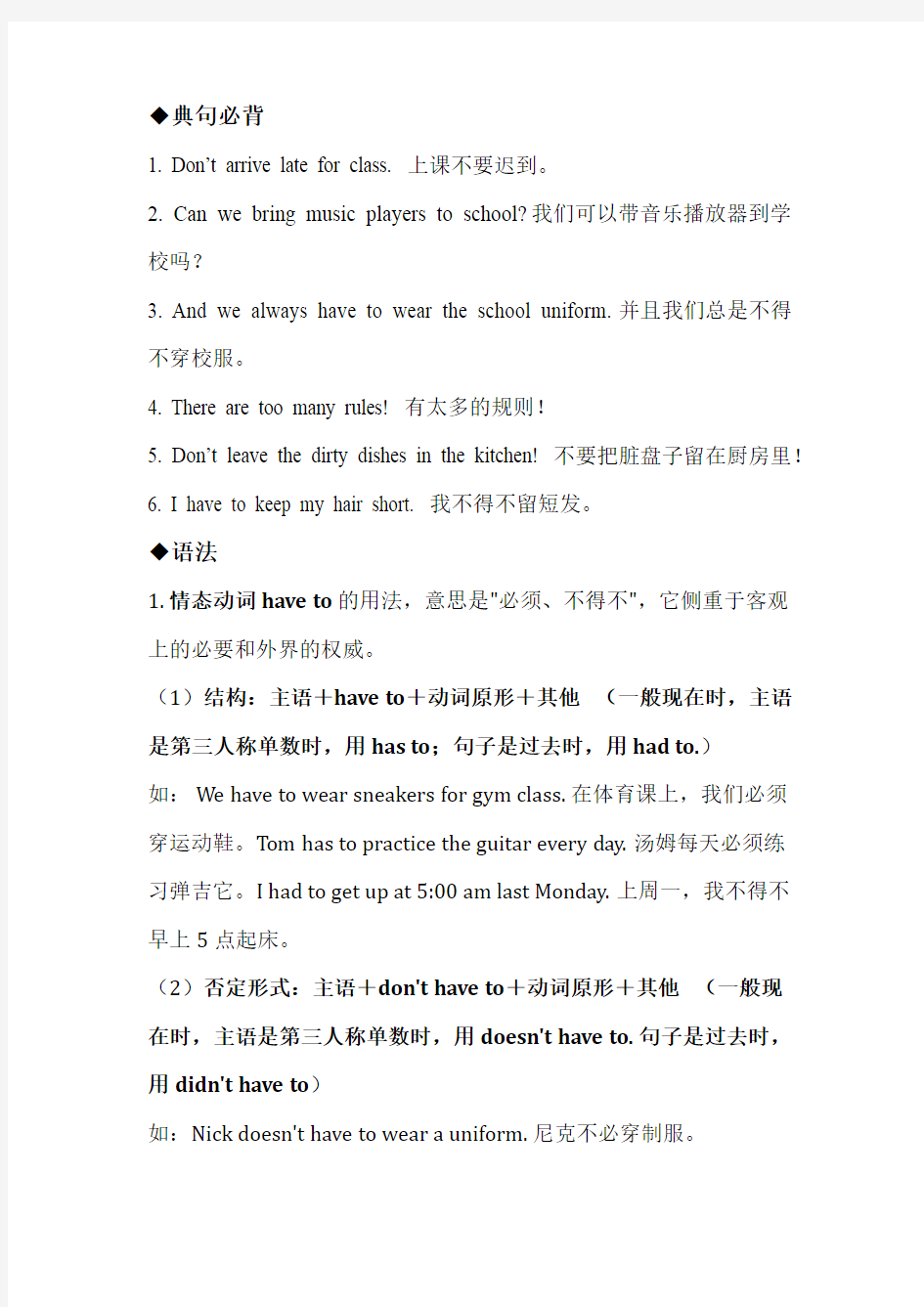人教版七年级下册英语第四单元知识点总结归纳


人教版七年级下册第四单元知识点归纳
Unit 4 Don’t eat in class.
◆短语归纳
1. on time 准时,按时
2. listen to 听……
3. in class 在课上
4. be late for 做……迟到
5. dining hall饭厅,餐厅
6. be quiet 安静
7. go out 外出8. do the dishes 清洗餐具9. Make breakfast 做早饭10. make (one’s) bed 铺床11. be noisy 吵闹12. keep one’s hair short 留短发
13. play with sb. 和某人一起玩14. play the piano 弹钢琴15. have fun 玩得高兴16. make(up)rules 制订规则17.school rules 学校规章制度18. on time准时(in time及时)
19.break(fallow/keep)the rules 违反(遵守)规章制度
20. arrive late for class = be late for class 上课迟到
21. eat in the classroom 在教室里吃东西22.. wear a hat (hats) 戴帽子
23.school uniforms校服24. wear uniforms穿制服
25.I see我明白了26.according to根据,依据
27.share (sth )with sb和某人分享(…)
28. on school days在上学期间29. on school nights在校期间的晚上
30. practice (playing) the piano 练习弹钢琴31.see friends看望朋友
32.clean (one’s) room打扫房间33.do the dishes洗餐具
34. too many/much太多的(可数/不可数) 35. learn to do sth学(做某事)
36.go to bed去睡觉(be in bed 在床上)37.think about (sb/sth/doing sth)考虑(某人/某物/做某事)
38.be strict (with sb)对某人)要求严格39. . Don't talk. = No talking.不要说话
◆用法集萃
1. Don’t + 动词原形+其他,不要做某事。
2. help sb. (to) do sth. 帮助某人做某事
3. too many + 可数名词复数太多的……
4. practice doing sth. 练习做某事
5. be strict with sb. 对某人要求严格
6. be strict in sth. 对某事要要求严格
7. leave sth sp. 把某物忘在某地
8. keep + 宾语+形容词使……保持某种状态
9. learn to do sth. 学会做某事
10. have to do sth. 不得不做某事
◆典句必背
1. Don’t arrive late for class. 上课不要迟到。
2. Can we bring music players to school? 我们可以带音乐播放器到学校吗?
3. And we always have to wear the school uniform. 并且我们总是不得不穿校服。
4. There are too many rules! 有太多的规则!
5. Don’t leave the dirty dishes in the kitchen! 不要把脏盘子留在厨房里!
6. I have to keep my hair short. 我不得不留短发。
◆语法
1.情态动词have to的用法,意思是"必须、不得不",它侧重于客观上的必要和外界的权威。
(1)结构:主语+have to+动词原形+其他(一般现在时,主语是第三人称单数时,用has to;句子是过去时,用had to.)
如:We have to wear sneakers for gym class.在体育课上,我们必须
穿运动鞋。Tom has to practice the guitar every day.汤姆每天必须练
习弹吉它。I had to get up at5:00am last Monday.上周一,我不得不早上5点起床。
(2)否定形式:主语+don't have to+动词原形+其他(一般现
在时,主语是第三人称单数时,用doesn't have to.句子是过去时,用didn't have to)
如:Nick doesn't have to wear a uniform.尼克不必穿制服。
We didn't have to do our homework at once.我们不必马上完成作业。疑问句:Do(Does或Did)+主语+have to+动词原形+其他如:Do you have to stay at home on weekends?周末你必须呆在家里吗?
Yes,I do./No,I don't.是的,我必须。不,我不必。
Did he have to go to bed by11:00last night?昨晚,他不得不11点前上床睡觉吗?
2.情态动词can的用法
(1)表示能力,"会""能"(在第一册中已经学习这种用法)
Can you play the guitar?你会弹吉它吗?
Judy can speak a little Chinese.朱蒂会说一点中文。
I can dance and sing.我能唱歌又能跳舞。
(2)表示允许、许可,"可以"、"能"(在这一课中新学的词义)Can the students run in the hallways?学生们可以在走廊上跑吗?We can eat outside.我们可以在外面吃东西。Can I come in?我能进来吗?
注意同样是情态动词,can和have to的用法是有区别的,和大部分情态动词一样,can在否定句中,直接在can后加上not,在疑问句中,把can放到主语前面,并且没有人称和数的变化。
3.be in bed"在床上、卧床"in和bed之间不能用冠词,bed也不用复数。He is in bed for10years.他卧床10年了。
Dave has to be in bed early every night.大卫每晚必须很早睡觉。
4.arrive late for与be late for意思相近,"迟到"Don't arrive(be)late for school.上学别迟到。I arrived(was)
late for the meeting yesterday.我昨天开会迟到了。
5.No talking!"禁止交谈!"no后面加上名词或动名词(doing)也表示不要做某事。与don't+do的用法相似。
No wet umbrellas!/Don't put wet umbrellas here!禁止放湿雨
伞!No food!Don't eat food here!禁止吃食物!
No smoking!Don't smoke here!禁止吸烟!
6.语法(祈使句)祈使句是用来表示请求、命令、叮嘱、号召或者劝告等的句子,这类句子的主语常是第二人称you,也就是听话者,因而you常省去了。祈使句的开头是动词原形。如:Look out!小心!Wait here for me!在这等我!Be sure to come here on time!务必准时来到这里!
祈使句的否定形式多以do not(常缩写成don't)开头,再加上动词原形。
Don't arrive late for school.上学别迟到。Don't fight!别打架!
Don't look out of the window.不要向窗外看
◆话题写作
Dear Tom,
Thanks for your last letter. You want to know the rules in our school. Now let me tell you about them.
We can’t arrive late for class. We can’t talk loudly in class. We
should keep quiet. When we meet our teachers on our way, we should say hello to them. We can’t eat or drink in class, and we can’t listen to music or play games in class.
I think we have too many rules. What about yours? Please write and tell me.
Yours,
Li Ming
